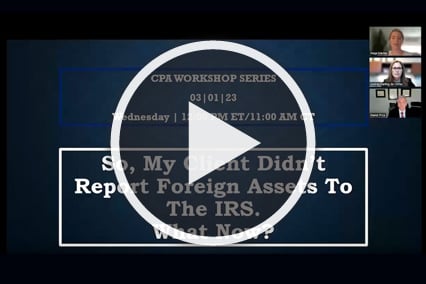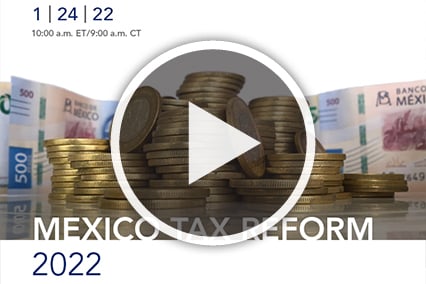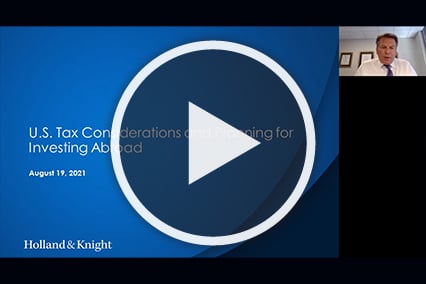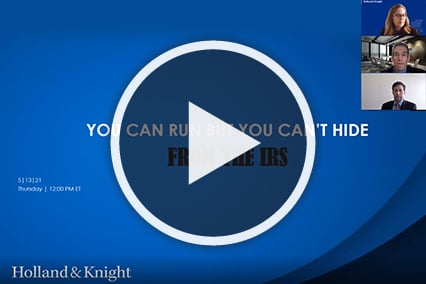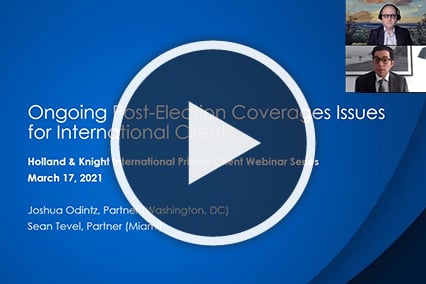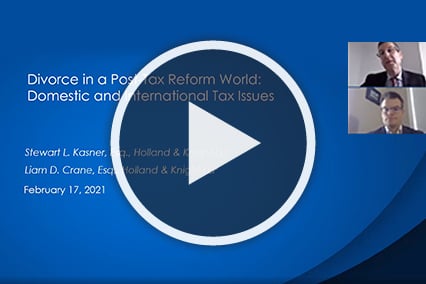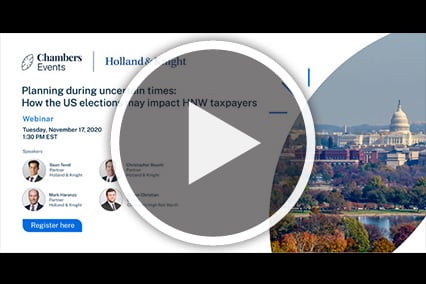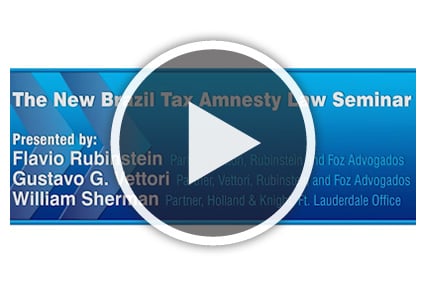Offshore Tax Compliance
- The U.S. continues to crack down on taxpayers, financial advisors and banks that do not properly report foreign assets. There are five voluntary disclosure programs that can mitigate penalties, and Holland & Knight's Offshore Tax Compliance Team advises clients on all of these initiatives.
- Clients frequently turn to Holland & Knight's Offshore Tax Compliance Team before making foreign investments to structure accounts for maximum tax benefits while adhering to compliance standards.
- We have represented hundreds of taxpayers in IRS audits and examinations as well as in tax courts, and our tax lawyers often achieve favorable administrative resolutions that avoid litigation.

Overview
For almost a decade, the United States has aggressively reviewed the offshore asset holdings of U.S. citizens in an effort to ensure compliance with applicable laws and regulations. To clamp down on tax evasion and criminal activity, the U.S. Department of the Treasury has instituted complex reporting requirements for everything from foreign bank accounts to overseas inheritances and trusts. Penalties can be severe and may even surpass the value of the unreported assets. The IRS Criminal Investigation Division has a presence in 11 foreign nations, and has indicted hundreds of individual and corporate taxpayers, financial advisors and bankers in alleged schemes to evade taxes.
We help owners of foreign assets avoid enforcement actions by advising them on efficient structuring of these assets, compliance with complex reporting requirements and mitigation of penalties when they are the target of enforcement actions.
Our Offshore Tax Compliance Team has in-depth experience with the Foreign Bank and Financial Account (FBAR) regulations, Foreign Account Tax Compliance Act (FATCA), Bank Secrecy Act, Foreign Corrupt Practices Act (FCPA), immigration rules, and various investigative priorities of the Treasury Department, IRS and U.S. Department of Justice (DOJ).
To better serve our clients, the Offshore Tax Compliance Team works closely with our Tax Controversy and Litigation Team. Many of our attorneys previously served as prosecutors in these government agencies, and they leverage the relationships and knowledge gained in their earlier careers to assist clients.
FATCA Compliance
FATCA requires foreign financial institutions and certain other nonfinancial foreign entities to report to the U.S. the foreign assets held by their U.S. account holders. Failure to do so results in withholding on withholdable payments. The underlying legislation also requires U.S. citizens to report their foreign financial accounts and foreign assets, depending on the value, on IRS Form 8938.
This law, enacted in response to the creation of overseas tax havens, carries both civil and criminal penalties and applies not only to U.S. citizens (including those living abroad) but also to insurance companies, financial institutions and fund managers. Our Offshore Tax Compliance Team has counseled on Form 8938 and proper completion of Form W-8BEN-E, as well as on all aspects of FATCA since the law was enacted in 2010.
Tax Reform Unlikely to Alter Offshore Compliance
If and when tax reform occurs, it is unlikely to change offshore compliance matters. The global trend over the past few years has been toward more rigorous enforcement – and that is likely to continue. FATCA and the Automatic Exchange of Financial Information referred to as CRS (the Common Reporting Standard) are here to stay.
For example, the International Consortium of Investigative Journalists published the Panama Papers in June 2016. This consisted of 11.5 million leaked documents revealing detailed financial and attorney-client information for nearly 215,000 offshore entities administered by the law firm Mossack Fonseca. The IRS is investigating the U.S. beneficial owners of the shell companies and individuals named in the documents, and governments around the world are doing similarly.
Our offshore tax compliance attorneys are following these developments closely, as well as related investigations by the IRS Global High Wealth Industry Group, sometimes called the Wealth Squad. This specialized group of highly trained auditors focuses on investigating high-net-worth individuals with foreign assets and audits aggressively. Holland & Knight has found that early engagement with examiners is critical and can lead to more favorable outcomes.
Voluntary Disclosure Guidance
For many decades, the IRS Criminal Investigation Division has offered taxpayers the opportunity to resolve tax issues through a voluntary disclosure. The procedure is explained in the Internal Revenue Manual. Taxpayers benefit from making a voluntary disclosure in that they avoid criminal prosecution and may reduce the extent of the civil penalties. However, beginning in 2009 with the crackdown on taxpayers holding unreported foreign accounts, the IRS has offered taxpayers numerous options through which to resolve their noncompliance. Although taxpayers often must pay penalties under these programs, they may be able to avoid far harsher sanctions that would arise if they are the target of an audit or enforcement action.
Currently, the IRS offers five options for resolving noncompliance involving foreign assets:
- Offshore Voluntary Disclosure Program (OVDP)
- Streamlined Domestic Offshore Procedures
- Streamlined Foreign Offshore Procedures
- Delinquent FBAR Submission Procedures
- Delinquent International Information Return Submission Procedures
We advise clients on participation in these programs, as well as on the benefits and detriments of each.
The regulations governing these programs adjust from time to time, and our Offshore Tax Compliance attorneys can counsel taxpayers on which of these programs is best suited and can provide the greatest protection for their situations. The various OVDPs, under which the IRS says the government has collected more than $9.9 billion from 55,800 taxpayers from 2009 through early 2017, have undergone recent changes that may make the costs prohibitive for many taxpayers. Additionally, 48,000 taxpayers have joined the streamlined programs and paid $450 million.
Gifts and Bequests
Taxpayers who receive a gift from a foreign person or entity often are surprised to learn that the gift may have to be reported to the IRS. This includes gifts from individuals, foreign corporations in which the taxpayer does not own stock and foreign partnerships in which the taxpayer is not a partner, as well as distributions from a foreign trust. Not only is the failure to file the form subject to penalties, but the statute of limitations on the underlying tax return is suspended until the proper form is filed.
A Sampling of Common Forms
Over the past several years, the IRS has introduced new information forms and broadened the list of situations requiring taxpayers to file existing forms. As a result, there is an increasing burden for taxpayers to remain compliant. We advise on the proper manner to report foreign assets, including:
- gifts and bequests from foreign persons and foreign estates
- gifts from foreign corporations and partnerships
- gifts and bequests from a covered expatriate
- distributions from foreign trusts
- ownership of a foreign trust
- ownership of foreign bank accounts
- ownership of shares in a foreign corporation
- ownership of shares in a passive foreign investment company
- ownership of specified foreign financial assets
- ownership of foreign disregarded entities
- foreign ownership of disregarded entities
Taxpayers failing to file the appropriate form – reporting receipt of a gift or ownership of a foreign asset or receipt – can incur drastic financial consequences. However, whether taxpayers learn in advance of their noncompliance or are informed by the IRS of such failure, our Offshore Tax Compliance Team advises such taxpayers on how to present a reasonable-cause argument to the government.
Prevention is Critical
We encourage anyone with ownership of foreign assets to seek counsel on the best manner for structuring ownership and reporting of those assets. The goal of our Offshore Tax Compliance Team, as well as our overall Taxation Practice, is to keep you compliant in the ever-changing world of foreign asset taxation. Our attorneys collaborate in all areas of tax practice, wealth planning, litigation, investigations and international wealth preservation to stay abreast of changes in the law and regulations in order to minimize taxpayers' exposure resulting from ownership of foreign assets or doing business offshore.




